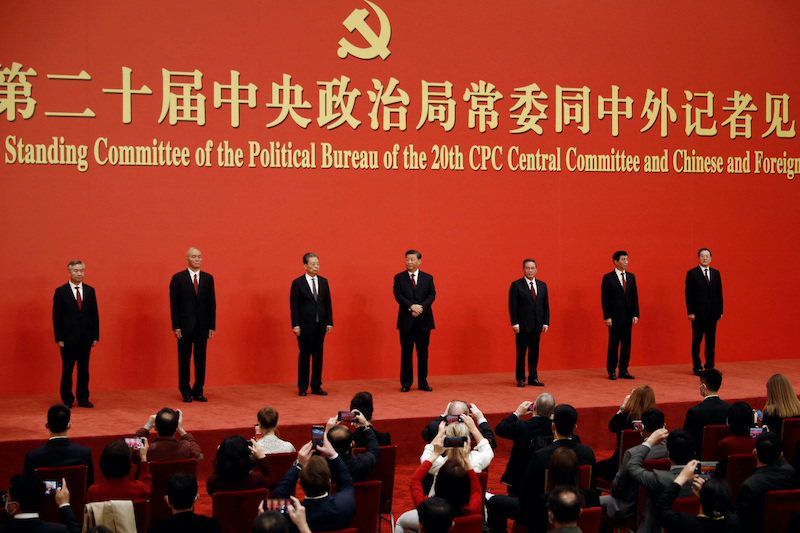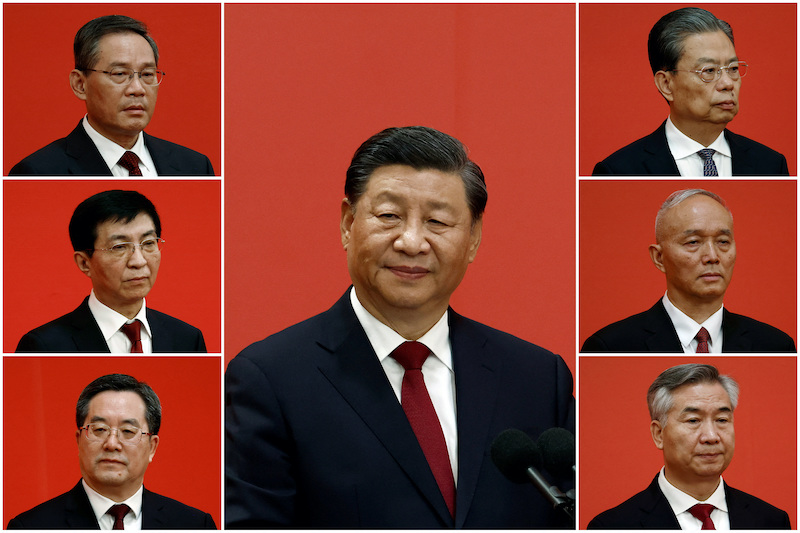Li Qiang, the 63-year-old Communist Party chief in Shanghai, is likely to succeed Li Keqiang as China’s next premier when the latter retires in March.
Li Qiang followed Xi Jinping onto the stage at the Great Hall of the People in Beijing on Sunday as the new leadership team was introduced to the media.
Xi secured a record third term as leader, as expected, and introduced the six other members of the Politburo Standing Committee, China’s top governing body.
The others, described by analysts as loyalists, are: Zhao Leji and Wang Huning, who return from the previous committee, and newcomers Cai Qi, Ding Xuexiang and Li Xi. Li Qiang is also new to the Standing Committee.
All are perceived to have close allegiance to Xi, 69, who was also re-appointed on Sunday as chairman of the Central Military Commission.

The unveiling of the Standing Committee and the larger 24-member Politburo comes a day after the closing of the Communist Party’s 20th Congress, where amendments were added to its charter aimed at cementing the core status of Xi and the guiding role of his political thought.
The Standing Committee lineup is confirmation that Xi’s grip on power is undiminished by the events of a tumultuous year, including a sharp economic slowdown, frustration over his zero-Covid policy, and China’s increasing estrangement from the West, exacerbated by his support for Russia’s Vladimir Putin.
Rough Road Ahead
China’s economy has high resilience, sufficient potential and room for manoeuvre, President Xi Jinping said during his address on Sunday.
And China will open its doors even wider, Xi said to dozens of journalists packed into a room inside Beijing’s Great Hall of the People.
China’s development was inseparable from the world and the world also needed China, Xi added, according to state media.
But most analysts say China new leaders will face a difficult time, as the world’s second-largest economy is facing a potentially painful rebalancing of its investment- and property-led model.
China’s assertive foreign policy is also in the spotlight after a Hong Kong protester was dragged into the Chinese consulate in Manchester on Sunday and assaulted in an incident which the police are investigating.
“The result was a resounding victory for Xi, more decisive than many experienced observers had forecast,” said Richard McGregor, Senior Fellow for East Asia at the Lowy Institute think tank in Sydney.
“All of his rivals, potential and real, have been forced out of the Politburo Standing Committee and Xi loyalists took their place. The new Politburo is an emphatic statement of Xi’s dominance over the party.”
‘Personalised Dictatorship’
Willy Lam, a senior fellow at US think tank the Jamestown Foundation, described the outcome as “an abnormally lopsided victory for one faction”, which he said was rare in the tradition of the Communist Party, because “in the past there would be a rough balance of power”.
“It means there won’t be any checks and balances,” he said. “Xi Jinping also has total control over the larger Politburo and Central Committee.”
Chris Miller, a professor at Tufts University in Massachusetts, said 20th party congress continued the shift away from collective leadership of party elites toward a personalised dictatorship.
“It also appears to have confirmed the downgrading of economic growth as a key party goal, relative to other agenda items such as zero-Covid and the party’s political and ideological control.
“On tech, the key theme was self-sufficiency in science and technology, which is to be expected given the increasing decoupling of the US and Chinese tech sectors.”
Ja Ian Chong, a political scientist at Singapore’s National University expects there will be more focus on party-state control over business, less dependence on imports, more assertiveness in foreign policy and security, including more “US-PRC friction”.
“Investment will likely seek to meet those above goals, especially if they can bring in technology. So while there may be opportunities for investors, they have to look to both market forces and political preferences more,” he said.
Moderates Excluded
Alvin Tan, head of Asia FX strategy at RBC Capital Markets in Singapore, said the new leadership “does mean that there is likely to be more deference to Xi Jinping’s own views about how to move the country and the economy forward.
“I can imagine that zero-Covid policy is likely more entrenched, and there’s going to be further push on this issue of common prosperity and the like,” he said.
As expected, the new line-up does not include a clear successor to Xi, the son of a Communist Party revolutionary who has taken China in a more authoritarian direction since rising to power in 2012.
The unveiling comes a day after Li Keqiang and Wang Yang, seen by analysts as relative moderates that were young enough to serve longer in top decision-making bodies, were excluded from the wider Central Committee.
Both have ties with the Communist Youth League, a once-influential group that experts say has lost power under Xi.
Xi laid the groundwork to rule beyond a decade when he eliminated the two-term limit on the presidency in 2018. His term as president is likely to be renewed at the annual parliamentary session in March, where the next premier will also be officially named.
- Reuters with additional editing by Jim Pollard
NOTE: This report was updated with further details on October 23, 2022.
ALSO SEE:
China’s No-2 Li Keqiang Axed From Politburo, Central Committee
China’s Central Bank Chief Seen Retiring As Reformers Axed
China, Saudi Arabia Pledge Closer Energy Cooperation
























